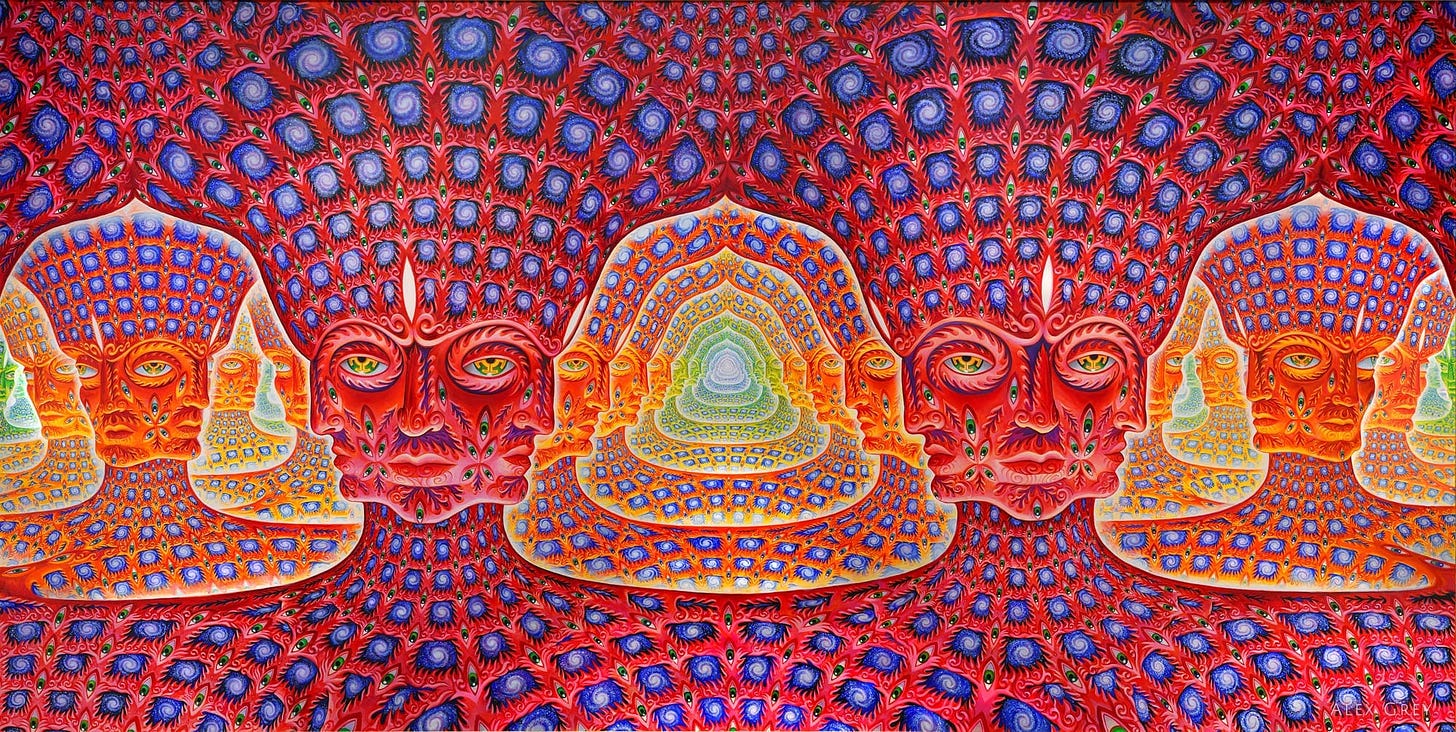What comes after?
post by rogersbacon · 2023-04-26T12:44:24.157Z · LW · GW · 0 commentsThis is a link post for https://www.secretorum.life/p/what-comes-after
Contents
No comments
The brain is wider than the sky,
For, put them side by side,
The one the other will contain,
With ease, and you, beside.
— Emily Dickinson
Kevin Kelly asks, “In the story of biological or technological evolution—what comes after minds?”
The usual response to “what comes after a human mind” is better, faster, bigger minds. The same thing only more. That is probably true—we might be able to make or evolve bigger faster minds—but as pictured they are still minds.
A more recent response, one that I have been championing, is that what comes after minds may be a biosphere of minds, an ecological network of many minds and many types of minds—sort of like rainforest of minds—that would have its own meta-level behavior and consequences. Just as a biological rainforest processes nutrients, energy, and diversity, this system of intelligences would process problems, memories, anticipations, data and knowledge. This rainforest of minds would contain all the human minds connected to it, as well as various artificial intelligences, as well as billions of semi-smart things linked up into a sprawling ecosystem of intelligences. Vegetable intelligences, insect intelligences, primate intelligences and human intelligences and maybe superhuman intelligences, all interacting in one seething network. As in any ecosystem, different agents have different capabilities and different roles. Some would cooperate, some would compete. The whole complex would be a dynamic beast, constantly in flux.

We could imagine the makeup of a rainforest of minds, but what would it do? Having thoughts, solving problems is what minds do. What does an ecosystem of minds do that an individual mind does not?
And what comes after it, if a biome of intelligences is next? If we let our imagination construct the most complex entity possible, what does it do? I have found we either imagine it as an omniscient mind, or as a lesser god. In a certain sense we can’t get beyond the paragon of a mind.
Cultures run on metaphors. The human mind is the current benchmark metaphor for our scientific society. Once upon a time we saw nature as an animal, then it was a clock, now we see it as a kind of mind. A mind is the metaphor for ultimate mystery, ultimate awe. It represents the standard for our attempts at creation. It is the metric for complexity. It is also our prison because we can’t see beyond it.
I don’t believe that, but I don’t know what the answer is either. I think it is too early in our technological development to have reached a limit of complexity. Surely in the next 100 or 500 years we’ll construct entities many thousands of times more complex than a human mind. As these ascend in prominence they will become the new metaphor.
Often the metaphor precedes the reality. We build what we can imagine. Can we imagine—now—what comes after minds?
I love “What comes after…” questions. They can have a koan-like quality to them, like a version of “What is your original face from before your parents were born?” aimed at stretching your scientific or philosophical imagination. The best ones may be impossible to answer (or will have answers that are incomprehensible to the unaided human mind, like the idea of art is to a chicken), but it doesn’t feel like they are, and this is precisely why they are worth pondering—you can’t expect to do the impossible if you only think of the possible.
Give it a try.
What comes after consciousness?
What comes after thought?
What comes after emotion?
What comes after imagination?
What comes after language?
What comes after knowledge?
What comes after computers?
What comes after technology?
What comes after philosophy?
What comes after science?
What comes after art?
What comes after religion?
What comes after god?
What comes after you?
0 comments
Comments sorted by top scores.